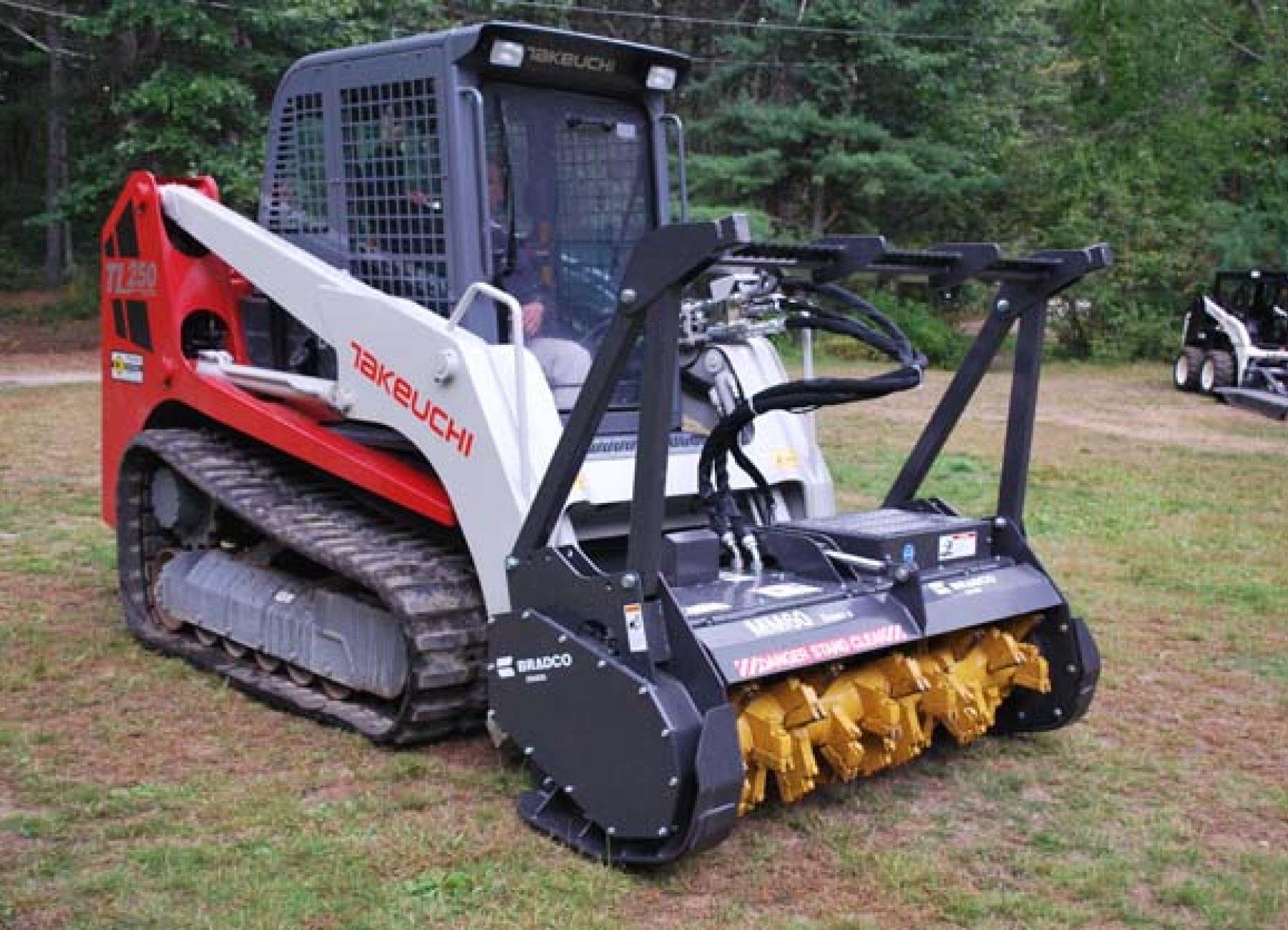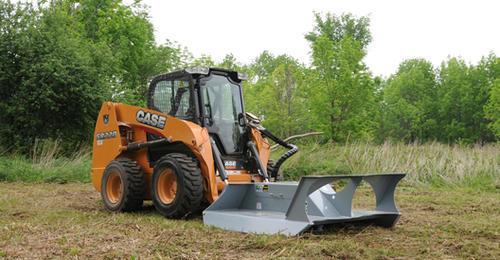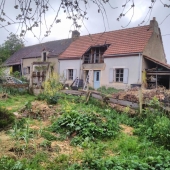
 3
3





 4
4




Some places need to be wild
 3
3




Gail, do you drive over that bridge? if you can drive you can get a mini excavator over it. If you have the gumption to dig then you can easily manage a mini ex with about a half hour practice. I would rent one if you can find a place and drop it on the far side of the bridge. Having said all that I know I have dug a great deal usually for electrical trenches, post footings and the occasional addition on an island. If it is a grown human in decent shape I use 1 cubic yard in decent soil as a good number for a day including moving it and doing something with it. You can move more then that is a single day but day in day out that is a good number...Gail Jardin wrote:So I keep running into the obstacle of not being able to find a contractor to bring a backhoe or excavator out to my land because of the bridge leading into the property. None of the neighbors have any heavy machinery that works. Is it possible to do this actually by hand and small power tools?
Here is a basic description of my land: 6.3 acres with a triangle shaped close to the south east corner of the parcel. From the pond to the parcel line there are large boulders that I do not plan to split and move at this point. Diagonally back from east too west there is a 100 foot wide strip of mostly brush and small trees up to the corner of the pond, here there is a small berm/hill and a large oak. From the jeep/atv trail to the berm is about 450 feet. Facing west there is another large oak directly across the previously cleared area about 100 feet away. Heading to the western edge of the property is dense woods that I would like to find a way to utilize for food. This has a slight rise in elevation with the south west corner being the top of the ridge.
Here is a list of my goals that need to be done before we can live there:
Brush cut and cut small trees for a driveway about 15 feet by 100 feet. Save all wood for future projects ranging from hugle mounds to cordwood sheds.
Brush cut and clear a parking area for my bus large enough for it to turn around in and clear a garden area I'm not sure how large this has to be?
My bus is 40 feet and I don't maneuver it gracefully. I would need to fence the garden with chicken wire at the least. I will use a rototiller attachment from trimmer plus to start this temporary initial garden space. Right now I have enough plants started for 10 4x10 beds but our community garden is shut down.
Brush cut a path for the solar electric fence near the bus for goats to begin brush clearing and make a skid shelter to move from pen to pen as well as make a sturdy shed near the bus. Until I know the land and neighbors well I want to keep animals close at night.
Goals I want to accomplish as soon as possible:
Create an earth bag storm shelter/root cellar. Is this even possible without a backhoe or excavator to clear some land and dig a hole? I'm thinking I can put my kids to work digging and filling bags while I do other projects?
Build a frame for an IBC tote for gravity fed water while we scour the property for a potential spring and/or well digging site. How on earth can I dig a well when no one will bring in machinery?
Stock the pond that is over grown with algae I have only seen turtles near it and have not caught any fish when fishing. I will also be getting ducks and geese to enjoy the pond.
Long term goals:
Having a safe happy, healthy and hardy homestead that my children and I can enjoy for years to come.
 5
5




“All good things are wild, and free.” Henry David Thoreau
 5
5






"Study books and observe nature; if they do not agree, throw away the books." ~ William A. Albrecht
 3
3




I want to be 15 again …so I can ruin my life differently.
 2
2




 3
3




'Theoretically this level of creeping Orwellian dynamics should ramp up our awareness, but what happens instead is that each alert becomes less and less effective because we're incredibly stupid.' - Jerry Holkins
 2
2




 1
1




 1
1




 1
1




 5
5




 4
4








Rufus Laggren wrote:Gail
All the comments above were pretty much spot on. But I think there may be some preliminary issues to arrange, at least in your own mind, before specific answers to particular problems will matter much.
Bruce is right, one thing at a time causes less panic. But you really need a Plan. You have a short list and that is SUPER! Now walk that list back and pick out what _must_ be done _when_. Then take the (shorter) list and walk it back, noting what must happen FIRST before each item on your "critical" list can possibly get done. The resulting "lists" should not be huge.
D-Nikolls put his finger on your critical, first, unavoidable issue: The Bridge. It sounds like you might not get your bus over it safely. _THAT_ is huge and not going away and it's not something to just wing it. You need to get good info (which probably means from several different knowledgeable people who look at the bridge in person). Then decide: Are you ever going to get the bus over the bridge? Are you even going to be able to safely drive a subcompact car over the bridge during the next 10 years or so? A whole lot (like, almost everything) depends on this issue. It's almost certainly going to come down to a "judgement call". Ie. a pure guess on which you gamble, and gamble _big_. The question is not going away. It sounds like getting as much info and making as good a guess as you can about that bridge is your first project. Everything else can go hang. After you make your personal decision about your bus and future options and transportation for yourself and your children, you can work on talking others into getting stuff you may need over that bridge.
If it looks like you should not try driving your bus across the bridge, what then? Can you reconfigure your life w/out your bus? Or will you try it anyway? Put your papers in order, make sure there is somebody to take care of your children if worst comes to worst, call a friend to stand by with a cell phone and watch it happen and then just say a prayer and drive the bus on the bridge and hope you make it across?
Ok. That was not nice reading. But it's not nice to sit quiet when a person looks to be, based on the info you provided in this thread, proceeding w/out knowledge or appreciation of certain immediate and unavoidable serious risks. Perhaps you have this covered? That would be good - but you haven't said anything above which covers it, so I have tried to be clear about something that looks serious to me.
After that, prioritize and make clear in your head the "needs" and "wants". And the relative order of the needs. (Eg. a well can wait a while, a roof over you and electrical power, not so much.) You _will_ need to cut corners, compromise, and just plain forget about a bunch of stuff, at least for the foreseeable future. The lists and priorities will change as you move forward, but you need a solid grasp of the current picture as you can see it, your priorities and the major problems, if you hope to make reasonable decisions. And there will a _lot_ of decisions.
Make an overall plan first. Most of it will change around as time goes on, but you _must_ have one. It is the skeleton of your future and your future needs it if you're going to try putting flesh to your your dreams. Plans include factoring your available time. Eg. you've got what? another 40 good years? Ah, well, joke. <GG> Maybe. Your time will be the most critical resource and greatest "must have" unless you want to go on as your are right now for the next 20 years (ie. forever). Be very _very_ careful about ideas of doing things manually with hand tools unless you hugely reduce your requirements to something you _know_ you personally can accomplish in six months. Be very _very_ careful about thinking "I can do this" or "I can do that" unless you yourself have actually done that job, with the tools you now have or can buy with the money you now have in the bank, several times. Yes, you _can_ do things. But everything _you_ do that you have not done professionally will take 10 times longer and cost twice (at the very least) as much as you originally think. BTDT, over and over.
Going forward. Driveway first? Ok. What is the absolute minimum (read cheapest) build quality and design that will get your bus safely (assuming the bridge doesn't take it off the table) to your site? What does it take to get that done? Can that happen this year? When? If you can get that figured out and you're bright-eyed, boss bushy-tailed, on a roll, that is the time to improve the quality of the driveway plan, up to the limit of your resources. But FIRST, figure out how you will get the meanest, cheap-shit barely adequate dirt trail that (almost) for sure will serve your needs. If you can't get the minimum done, there is nothing else to worry about.
1a) Phase 1 basic necessities plan.
1b) Phase 1 budget.
1c) Phase 1 time table. (Is this ever going to happen...)
0) (move to top, before the ones) Go to church religiously, sincerely and be a good person. Talk it up with everybody and butter up anybody that looks like they might be worth it. (Eg. tow truck drivers, god, other likely prospects you come across...)
That is how one plans large projects. That one really wants to complete.
In over your head? Well, DUH! Good for you taking a jump! You got good lists started, keep paddling. Keep your eyes open, pay attention to everything. Don't keep your head down, keep it up. You _need_ to see opportunities when they roll by. It's an ongoing process and things will change as you progress.
Cheers,
Rufus
 2
2




John Daley Bendigo, Australia The Enemy of progress is the hope of a perfect plan
Benefits of rainfall collection https://permies.com/t/88043/benefits-rainfall-collection
GOOD DEBT/ BAD DEBT https://permies.com/t/179218/mortgages-good-debt-bad-debt








 1
1




 1
1




"Study books and observe nature; if they do not agree, throw away the books." ~ William A. Albrecht
 1
1








James Freyr wrote:Hey Gail sounds to me like you're narrowing things down. Applause from me for utilizing the time right now and tackling the brush clearing using what you have :)
I sincerely believe a properly sized electric fence energizer with quality grounding will make the electric net keep those dogs away from your livestock. It's what I have and has worked for me. I recommend at least a 1 joule fence energizer and at least two ground rods, and that will make for a painful fence. If you'd like to get something that will allow for expansion in the unknown future, consider a 2 or 3 joule energizer.
I have a 4x4 truck, and along with what Rufus has said I hardly ever use it. I'm in 2 wheel drive 99% of the time, but... Every once in a while when I'm driving on my farm, having four wheel drive saves my bacon. I used to have a 2 wheel drive only truck, and it sucks to be phoning a neighbor with 4 wheel drive and a tow strap to recover my vehicle. It is so nice, and worth the extra cost to me, to be able to engage four wheel drive when I get in the soft ground and off I go. Part of my personality is I am happy to pay a little money for something that gives me independence, and four wheel drive in my pickup truck is one of those costs that was justifiable for me.
Good luck Gail and keep us posted with some updates if you would!
 1
1




Roy Long wrote:You can certainly pull those things off, not exactly sure why you be bringing in a backhoe for those things.
Get yourself a little chainsaw, I buy the cheapo Poulans in the 16 inch bar length, I can generally order them offline for $75 to $95... They are great for clearing small trees and whatnot, "I personally like them because of thow small they are, I am too old to be packing big saws around anymore".
Another that I do for general brush removal is I take an old but working lawn mower and cut from the right of the front left wheel across the front of the engine to the ride side. Then I mount the cutoff wheel to the right side of lawnmower. This allows the blade to run out in the open and you can cut down material four, five, six feet tall without having to chop it up under the mower. I can even cut down small trees with these modded mowers.
I would suggest that you think about your bridge issue, this is likely to remain a problem in the future. If they won't bring a backhoe over it will a firetruck drive over it? Will an ambulance cross it? I would love to see a pic of the bridge and pictures of your brush and trees.
I happen to build bridges for peoples properties, I might be able to come up with some simple ideas to make a stouter bridge...




Rufus Laggren wrote:Gail
Sounds like you're zeroing in on plans. That's great. Thanks for sharing. Most of us folk in cities are voyeurs at this point!
> firewood...
Might want a PlanB. Firewood can disappear real fast.
> chainsaw...
Please remember: Have somebody close with a phone, especially while learning. That goes for any heavy equipment or, really, most power tools. Guys work alone all day, but that's because they have to - no economic choice else. Our friend Travis on Permies here related how he almost died from a chainsaw accident - and that was after felling trees most of his life. The little safety things are sometimes easy to pass over when you've "lived city" most of your life or are embarking on new territory, but they really matter. Many professionals simply "won't" when it comes to power tools and ladders unless they have a partner. Really. That's one of the biggest reasons for seeing guys standing around road work leaning on shovels - they are there to save their partner's life and, to a great extant, any "work" they do is an extra freebie.
>4x4
Most country drivers don't use'm. 2x will get you pretty much anywhere. Reliability, carrying capacity, big gas tank are more important. Carry a "snatch strap" so somebody else with a vehicle can quickly get you going again if you get stuck. Way cheaper than burdened with the 4x4 hype.
Be safe.
Rufus

 1
1




"Never doubt that a small group of thoughtful, committed citizens can change the world; indeed, it's the only thing that ever has."-Margaret Mead "The only thing worse than being blind, is having sight but no vision."-Helen Keller








Rufus Laggren wrote:Gail
Sounds like you're pretty familiar with your territory and country practices. I'll be betting on You. <g>
It's hard to tell how much somebody knows when one responds to questions. Until more info is flowing, I error on the side of stodgy nit picking conservative safety blurbs. When something happens it happens instantly and usually without the slightest hint or warning. It can be as simple and ordinary as slipping on a dog's toy while using a power tool or catching the power cord of the saw (if it's a corded type) in a way the throws you hand off. You never know, you never will know, until it's over and sometimes not then. Safety is about doing things in a way that even when "stuff" happens, you end up all in one piece. It's a life style.
+10 on the locked elbow using a chain saw. That applies to a other power tools as well. The classic circular saw disaster is when the saw catches when cutting ply wood or ripping a long board, jumps the cut and runs back along the work piece toward the user and sometimes right up their leg or into their lap. A locked elbow can be your friend in a lot of situations where you DON"T want that machine to touch you.
> ladders
Ladders are considered dangerous tools because they put people up where they can fall and if unlucky break something critical. I didn't mean you were on a ladder using a chain saw. Never crossed my mind. _That_ is seriously perilous. Many professionals cut trees while hanging on a limb or a ladder, but they don't do it alone and it's the pinnacle of a wild and woolly trade. And it's only done by people the boss decides, after seeing them work for some time, won't cause him problems by getting hurt, hurting others or damaging equipment. IOW, it's a special place where very few belong.
Cheers,
Rufus
 2
2









 3
3




Community Building 2.0: ask me about drL, the rotational-mob-grazing format for human interactions.




John Daley Bendigo, Australia The Enemy of progress is the hope of a perfect plan
Benefits of rainfall collection https://permies.com/t/88043/benefits-rainfall-collection
GOOD DEBT/ BAD DEBT https://permies.com/t/179218/mortgages-good-debt-bad-debt

|
Cob is sand, clay and sometimes straw. This tiny ad is made of cob:
Learn Permaculture through a little hard work
https://wheaton-labs.com/bootcamp
|






